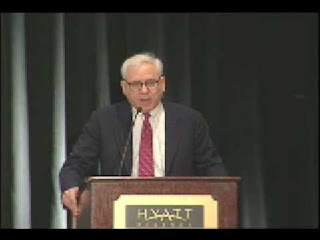Greed addicts turned out for the annual Bilderberg Conference, a global plotters convention. As usual, a number of private equity underwriters (PEU's) made the public list:
Altman, Roger C., Chairman, Evercore Partners Inc.
Castries, Henri de, Chairman and CEO, AXA
Collins, Timothy C., CEO, Ripplewood Holdings, LLC
Jacobs, Kenneth M., Chairman & CEO, Lazard
Johnson, James A., Vice Chairman, Perseus, LLC
Jordan, Jr., Vernon E., Senior Managing Director, Lazard Frères & Co. LLC
Keane, John M., Senior Partner, SCP Partners; General, US Army, Retired
Kissinger, Henry A., Chairman, Kissinger Associates, Inc.
Koç, Mustafa V., Chairman, Koç Holding A.S
Kravis, Henry R., Co-Chairman and co-CEO, Kohlberg Kravis, Roberts & Co.
Orszag, Peter R., Vice Chairman, Citigroup Global Markets, Inc.
Rockefeller, David, Former Chairman, Chase Manhattan Bank
Rubin, Robert E., Co-Chairman, Council on Foreign Relations; Former Treasury Secretary
Sutherland, Peter D., Chairman, Goldman Sachs International
Thiel, Peter A., President, Clarium Capital Management, LLC
Did Carlyle's David Rubenstein or Blackstone's Stephen Schwarzmen drop in like Bill Gates?
Here's a hint as to how pervasive private equity underwriters became the last decade. It's General Keane's bio from General Dynamic's SEC filings::
John M. Keane, 68, director since 2004.
Retired General, U.S. Army. Vice Chief of Staff of the Army from 1999 to 2003. Senior Partner of SCP Partners (private equity) since 2009. Managing Director of Keane Advisors, LLC, (private equity) from 2005 to 2009. Member of the Department of Defense Policy Board. Mr. Keane currently serves as a director of Cyalume Technologies Holdings, Inc., M&F Worldwide Corp. and MetLife, Inc.
The M & F Worldwide is MacAndrews & Forbers Holdings, which smells like a PEU. Keane is also a member of the Council on Foreign Relations, the United States Department of Defense Policy Board, a trustee of the Rand Corporation and a contributor for Fox News.
Previously, Keane
served as Senior Advisor for KKR, advised the Chairman & CEO of URS and
was on the board of Allied Barton Security.
Greed addicts need the help
of governments and international institutions to earn 30% annual returns.
Lamy, Pascal, Director General, World Trade Organization
Trichet, Jean-Claude, President, European Central Bank
Zoellick, Robert B., President, The World Bank Group
Keane
serves on the Energy Security Leadership Council of Securing America's Energy Future. Their recommendations shift the toll to drivers, while
sticking to oil.
Did the ESLC play a role in President Obama's declaring war on Libya? CNBC reported Libyan oil comes out of the ground for a buck a barrel.
Who's next on the attack list for Bilderbergers? Surely, our U.S. government attendees know:
Gates. Robert, Secretary of Defense
Steinberg, James B., Deputy Secretary of State
If Gates and Steinberg stays mum, maybe Christine A. Varney will speak up. One might expect an Attorney General to be open about the proceedings, allaying fears of U.S. officials conspiring with foreign leaders like.
Mandelson, Peter, Member, House of Lords; Chairman, Global Counsel
The world saw how Mandelson
helped free the Lockerbie bomber. He defended Tony Blair's outreach to Libya's Gadhafi. Did Bilderberg help rehab Gadhafi, before re-making him a pariah? Bilderberger
John McCain did his part with
both scripts.
Bilderberg retains its
PEU odor. Note the
crack reporting by the
Associated Press. At least
The Guardian sent a real reporter, who
asked questions. Did Charlie Skelton note the greed addicts
Internet theme? Democracies need to control the people's voice.
"Everyone recognised that the weakness of a democracy was that its government had to do broadly what the people wanted it to do …" Lord John Hope - Bilderberg meeting 1958
It's a longtime Bilderberg theme, recently
taken up by Sarkozy and company. Meanwhile
democratic money is free to move around the globe.
Update 6-13-11: General Keane's MacAndrews & Forbes $2.8 billion contract with the feds for smallpox antiviral medicine is
under scrutiny. M & F has
Frances Townsend (Red) and
Andy Stern (Blue) serving on SIGA's board. Both have personal poxes. Fran's
abysmal Hurricane Katrina
Lessons Learned report benefited W.'s
PEU friends. Andy Stern played
political theater challenging the same PEU's purchase of ManorCare. The watchdog
went to sleep after
the buyout. Andy did strike a labor agreement for
Connecticut rest stops before investigators hauled boxes from his
SEIU office.
Update 9-20-11: Defense industry consolidation calls for
mega-mergers. A Carlyle Group defense expert weighed in. Also, Carlyle owns Booz Allen Hamilton, which is in a unique position to steer combinations as a huge government consultant.


























